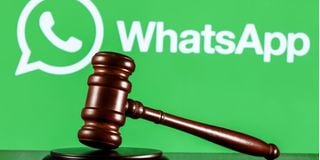
WhatsApp chats presented in court.
Do you chat with people on that phone or computer issued by your employer, thinking those are private engagements? Well, your employer is allowed to use whatever information you exchange over that gadget to build a case against you in case a dispute arises.
That is due to a developing precedent at the Employment and Labour Relations Court, which stipulates that whatever a person does with a company device is not necessarily covered by the constitutional right to privacy.
This is what the Constitution says on the right to privacy: “Every person has the right to privacy, which includes the right not to have (a) their person, home or property searched; (b) their possessions seized; (c) information relating to their family or private affairs unnecessarily required or revealed; or (d) the privacy of their communications infringed.”
According to three court decisions made over the past eight years, that right can be waived when it is a company device being used.
The date is March 30, 2017. Justice Monica Mbaru is issuing her verdict in a case where an employee of KPMG Advisory Services was asked by the CEO to present her phones, after which they were accessed and some information extracted from them. The employee had risen from a tea girl to a personal assistant amid claims that she was in a relationship with her superior.
Also Read: Lawyer challenges data commissioner powers
The court heard that the employer went through her phone records and checked her M-Pesa transactions.
“I take it the claimant (the personal assistant) while at work was allowed to have her personal phone and also had an office phone. A search of a personal phone by an employer with the consent of an employee has to stop the moment the employee says the same should stop. The use of data and information sourced from a personal phone is similar to doing a body search and using the information obtained,” ruled Justice Mbaru.
“At the point, the claimant was directed to surrender her personal phone with other workplace gadgets, was it made clear to her that the data sourced was to be used against her? In the presence of her superiors, was the claimant aware of her right to privacy and was this protected by the employer?” the judge further posed.
Justice Mbaru also observed that communications from the woman from her personal phone were protected unless “such are sent to her workplace communications or sent to persons at her workplace and they have made a complaint”.
“The information sourced of and from the claimant’s personal phone shall be expunged from the record. What is available for the disciplinary hearing shall only relate to her work phone and work laptop,” she ruled.
Then comes June 29, 2017. Justice Mbaru is ruling on another case where an employer went through the emails exchanged by an employee to establish whether the employee was asking clients to pay him directly rather than make payments to the company. The case involved Peter Apollo Ochieng and Instarect Limited.
“Access to workplace emails and communication is a prerogative of the employer. Where an employee uses workplace tools, time, resources to send communication, such time, tools and resources are the property of the employer,” Justice Mbaru ruled.
She further cited another decision she had made in 2014 which stated that using an employer’s computer to apply for another job amounts to misconduct.
“Such work email is the property of the employer. An employee cannot claim privacy over matters shared, included or shared out of such an address at the expense, time or within the tools allocated for work by the employer,” she had observed in the September 2016 verdict.
Also Read: ‘Mzungu’ boyfriend posted intimate videos of me on international platforms; what can I do?
The most recent pronouncement on privacy relating to employer-issued gadgets came on January 17, 2025, in a case decided by Justice Jorum Abuodha in a case involving a teacher fired from Makini Schools.
The teacher, Japher Nanjira Musa, had protested the fact that part of the evidence used against him was from WhatsApp chats that had been found on a work laptop belonging to a human resources officer.
However, Justice Abuodha said it did not amount to a breach of privacy for the employer to act on WhatsApp chats made on a company computer.
“Section 6(1) (d) of the Access to Information Act puts limitations on the right to access information where it involves unwarranted invasion of privacy. It is the court’s opinion that the said WhatsApp messages were not held by (the teacher) but on the company’s laptop, thus his privacy was not invaded. This position has been judicially stated in the cases relied on by (Makini Schools),” the judge wrote, referring to Justice Mbaru’s earlier rulings.
As technology gets more and more entrenched in employer-employee disputes, courts have been forced to draw the line between employee privacy and the power an employer has to punish an employee.









